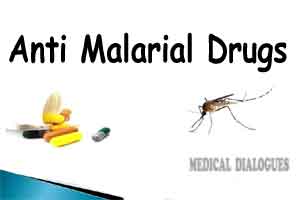- Home
- Editorial
- News
- Practice Guidelines
- Anesthesiology Guidelines
- Cancer Guidelines
- Cardiac Sciences Guidelines
- Critical Care Guidelines
- Dentistry Guidelines
- Dermatology Guidelines
- Diabetes and Endo Guidelines
- Diagnostics Guidelines
- ENT Guidelines
- Featured Practice Guidelines
- Gastroenterology Guidelines
- Geriatrics Guidelines
- Medicine Guidelines
- Nephrology Guidelines
- Neurosciences Guidelines
- Obs and Gynae Guidelines
- Ophthalmology Guidelines
- Orthopaedics Guidelines
- Paediatrics Guidelines
- Psychiatry Guidelines
- Pulmonology Guidelines
- Radiology Guidelines
- Surgery Guidelines
- Urology Guidelines
Antimalarial drug resistance cannot be passed on by mosquitoes

Washington D.C : In a breakthrough, a team of researchers has found that malaria parasites with a developed resistance to certain drugs cannot spread their resistance on.
The discovery could potentially shut down the avenue for mass drug resistance to spread, making malaria treatment significantly more effective for the 3.2 billion people at risk.
The international research project was led by the University of Melbourne and focused on the drug atovaquone.
The new study reveals that although some malaria parasites had developed a genetic mutation that protected them against the drug in early life, the mutation eventually killed the parasites by stopping production of an essential type of energy as they grew.
Lead authors Professor Geoff McFadden and Dr Dean Goodman are calling it a 'genetic trap' that could prove to be a significant step forward in the anti-malaria fight.
The pair, along with long-term collaborator Vanessa Mollard, led a team investigating the evolution and life cycle of the malaria parasite for the past six years.
"These results are very exciting because the spread of drug resistance is currently destroying our ability to control malaria," said McFadden, adding "We now understand the particular genetic mutation that gave rise to drug resistance in some malaria parasite populations and how it eventually kills them in the mosquito, providing new targets for the development of drugs."
McFadden noted that the development of drug resistance may not be a major problem if the resistance cannot spread, meaning the drug atovaquone could be more widely used in malaria control.
The study is published in the journal Science.

Disclaimer: This site is primarily intended for healthcare professionals. Any content/information on this website does not replace the advice of medical and/or health professionals and should not be construed as medical/diagnostic advice/endorsement or prescription. Use of this site is subject to our terms of use, privacy policy, advertisement policy. © 2020 Minerva Medical Treatment Pvt Ltd